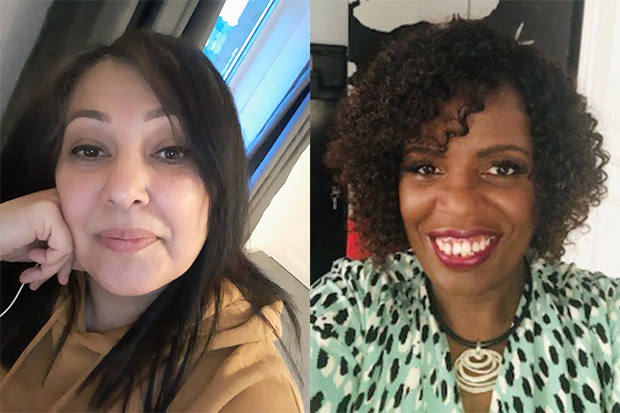Farrah Khan MBE, Leeds City Council and Sharon Davidson, Surrey County Council have been co-chairs of the Principal Child and Family Social Worker (PCFSW) Network since October 2020. The network brings together the Principal Social Workers (PSW) from local authorities (LA) across England to focus on improving social work practice and overcoming barriers to excellent social work.
Six months into their role, they discuss the importance of forging a strong female partnership and the friendship they found along the way.

Working together as co-chairs
Farrah: Taking on the role of co-chairs, I felt a mix of excitement, anxiety and anticipation – everything you might expect! But, in this joint role, Sharon and I have found a real sense of purpose through supporting each other. Working with Sharon has been a highlight for me. We share lots of the same values that are at the core of our practice. I’m excited about the partnership we’ve forged and the friendship we’ve found.
With myself in Leeds and Sharon in Surrey, virtual working has allowed us to connect in a way we might not have otherwise. We’re also more visible now and that has pushed me to grow a lot. We have to balance the demands of being PSWs in our own LAs and those of the network, but the two roles complement each other. We take learning from the national role into our own local authorities and vice versa.
As women in leadership, we want to drive the value of inclusivity in how we lead, so we need to constantly reflect. We are similar in that way; we don’t just agree to things but think them through. We have our own styles and feeling confident in who we are, as women of colour and leaders, is important. Ultimately we see our role as facilitators and enablers, not just decision-makers. Our belief in building relationships and restorative practice has helped us get to where we are.
Sharon: I felt a bit of trepidation at taking on the role at first, but I’d committed to a partnership with Farrah so I couldn’t withdraw! We were stepping into big shoes in terms of the previous chair, and I was unsure how we would be received. People have been supportive though; they have embraced our value base and we’ve been encouraged in different ways.
Now I’m excited about the possibilities for the network. The PSW role can feel quite isolating as usually, in most LAs, there is only one PSW. The network is really important because it connects people and it has helped to strengthen my confidence as a PSW. It’s also a significant time for practice, with the pandemic and, in the wake of George Floyd’s death, focussing on anti-racist practice. We want to keep thinking about how we connect these moments back to the values of social work, our core beliefs and our backgrounds.
We’re realising that we don’t have to fill anyone else’s shoes and can do things on our terms. We are letting go of any anxiety we might have felt and bringing our own leadership styles to the forefront. If we think about our own shoes, Farrah’s would be bohemian diamante slippers and mine would be very, very high red knee boots!
Farrah: There’s real value in how we speak and behave, and that goes for anyone who might not think they fit the template of leadership.
My job is a big part of who I am - I don’t see myself as a leader but as a practitioner first. It wasn’t ever what I aimed for, but championing practice has driven me here. It can be challenging as a woman, for example at times in my career, I’ve felt I have to be less of myself. I remember I used to try to sound less Northern when giving evidence in court, but now I know I continue to be me no matter who my audience is.
You might face prejudice and racism but you can use that as your driver. When you overcome barriers, you become stronger and more determined to hold on to the essence of who you are. Now, when I see newly qualified social workers from diverse backgrounds, I make myself visible to help them visualise themselves as management.
Taking the time to celebrate

Sharon: I love to celebrate things as much as I can, and in what has been a challenging year, we all need to reflect on our achievements.
March is the time to celebrate women and, for me, that’s about the acknowledgement of those I hold dearest – my mum, my sisters, aunts, cousins, friends and colleagues.
Farrah: We don’t have enough chances to celebrate the women who have come before us. They have held on to hope despite any barriers, and they still rise and achieve. The influence that women like my mother have had on me is huge.
Looking to the future, young women and girls give us hope. They are proud of who they are and challenging societal norms which excites me.
Every day women in social work use their hearts to drive practice, influence change and make a difference. Below is a poem I've recently written in honour of my mother's generation.
https://twitter.com/Farrahkhan152/status/1368835804928356353
Here is our advice for building your confidence as a leader:
- Believe in yourself - give yourself a talking to if you need to! Challenge the self-doubting voice in your head so you don’t fall down traps of negativity.
- Form alliances and seek support from other women. You’ll see strengths in others that they won’t recognise in themselves and vice versa, so build each other up.
- Don’t lose your essence. The woman your friends and family see needs to be the professional you. Women from ethnic minorities can feel pressure to conform but if you’re not true to yourself, the workplace and ultimately children and families miss out.
- Look to women in different sectors and focus on what you have in common. It can be harder to find diversity – Farrah reads everything that Michelle Obama writes.
- Don’t let other people’s discomfort, or how they perceive you, become a barrier. Outdated ideas of what the leadership looks like or how qualified you need to be shouldn’t lead you to second-guess yourself.
Do you know someone in Children’s Social Care who deserves an Honour? Find out how to nominate them for an award.
1 comment
Comment by Zoe posted on
Leadership is something I really struggle with so this was an interesting read!